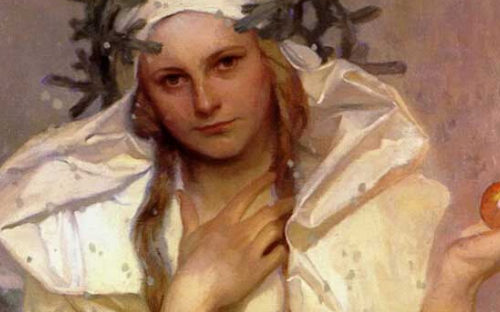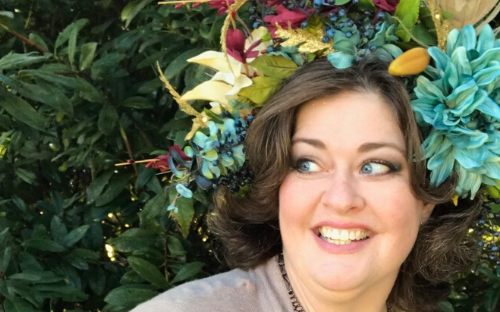
The Key is Connection: Tribe and Elderhood
There’s a well-known Nigerian aphorism: “It takes a village to raise a child.” The last time I checked, we all started our lives as children, so when exactly do we stop needing the village? As it turns out, there is an answer to this question. And the answer holds the key to a meaningful, happy life.
Merry meet, kind folk, and blessings upon you!
You know, life is hard enough; why face the challenges of life alone? Is that even healthy? I have encountered this bogus idea floating around in the current zeitgeist that the more you can achieve all by yourself, the cooler you are. If you can convince others that you are delighted live as a hermetically-sealed, self-contained entity, supposedly, you’ve reached an ideal. I find this ridiculous at the very least, and destructive at its worst. Of course, there is a distinction between personal responsibility and excessive reliance on others (and those are ideas I will eventually explore in detail here on the podcast). But the idea that humans are social creatures is more than a simple scientific fact, I believe it is a sacred truth.
Today, I will discuss four key principles of the Folkmother approach to life. These principles offer a time-honored solution to the modern trend of suffering in solitude.
Following the Folkmother Path can help you feel connected, supported, grounded, and fulfilled.
A Folkmother is a Wise Woman or Elder–she is an initiated, spiritually sovereign woman who is ready to do a great work for humanity, one small act at a time.
This is, of course, a very deliberate statement, loaded with meaning. This episode will focus on the first part: the fact that someone who seeks to be an elder is initiated. But what does that mean? What is initiation, and what does it have to do with feeling connected, supported, fulfilled, et cetera?
Look, I’m just as sick of all the pop culture “women over 40” magazine articles as you are, which is why I want you to know that I’m not attempting to give you a trite, pat answer.
Life is not a clean, white desk with a stick of paolo santo, and a steaming cup of tea in a hand-thrown mug next to a solitary mini cactus and a stack of chromatically-sequenced books. (Although looking at something like that sure is soothing, right?) But for every Instagrammer who posts that, there is an ocean of laundry behind her on the couch, and we all know it.
So as I go over these principles, keep in mind, humanity is weird and fallible, life is messy, and it is absolutely the truth that if we don’t work together, the chaos of nature will gobble us up.
That being said, there is gold to be found in this approach if you’re willing to face the dragon.
The first step on the Folkmother path is to Find your Tribe.
The Google definition of Tribe is:
“a social division in a traditional society consisting of families or communities linked by social, economic, religious, or blood ties, with a common culture and dialect, typically having a recognized leader”
…and I stay pretty close to that definition. There are a few qualities of a Tribe from my perspective that I believe are worth noting. One, that a Tribe may or may not include your blood relatives. Two, that religious dogma is optional, and three, that you share a dialect, meaning that you have a unique way of expressing yourself, and the folks in your Tribe can understand you. This is your village, your support system, your cheerleaders, and your challengers. Just enough pressure to help you grow, and just enough comfort to make life worth living.
Tribe should be there for your festivals and feasts, your funerals and losses, your rituals and revelries. Tribe adds plot to your story. A healthy Tribe embues us with a feeling of connection, and gives us a chance to feel human and behave humanely.
Finding Tribe may be as simple as rekindling family relationships or becoming more active in your synagogue. Or, it may require a journey into your genealogy or leaving behind toxic traditions and people.
If you have an alternative temperament and eccentric countenance, it can be difficult to find your people. Thankfully, with the help of the internet, locating weirdos like you nearby is pretty easy. But with or without the internet, I think the easiest way to find the right Tribe is to be the most radically-authentic version of yourself, in public, as often as possible. Those who love you for the traits that others may find off-putting are the real keepers.
I recommend keeping two things in mind when settling on a Tribe:
- Check the dark corners of the Tribe to be sure that the shadows and skeletons lurking there will not prove to undermine your efforts to grow. We’re talking about humans, here. There WILL be skeletons. Just make sure their effect on you will be somewhere in the range of negligible to manageable.
- Be certain you will have the ability to serve them in a way that is meaningful to you. The best scenario would be to match your natural talents with a role the Tribe needs filled. And be sure they are enthusiastic to have someone like you fill the role. That way, what you give won’t drain you, and their appreciation will fuel your desire to give even more. If you have room to serve and grow as an individual as you all reach for something greater as a collective, that’s when the real magic happens.
Once you have found your Tribe, the next step is Initiation.
Initiation is a rite of passage marking entrance or acceptance into a group or society. Often, these rites will be performed on a child to signify their passage into adulthood within a given culture or religion. If an adult is initiated, it is usually to bring them from the outside of the Tribe into the Tribe, or to mark the beginning of a sacred path, calling, or role of service within the Tribe.
Initiation usually consists of a collection of difficult trials. When the initiate has successfully passed these tests, they are often physically marked in a permanent way, acknowledged by the people in a public ceremony, and are given a new name. Sounds like marriage, doesn’t it? That’s because initiation is generally the first rite of passage that (in many cultures) makes you eligible for marriage. Initiation is a vow of fidelity to the Tribe: if you rely on them, can they rely on you?
Some folks think they can get the benefit of Tribe by picking and choosing the best of several groups, and leaving as soon as things get uncomfortable. I’m going to push back on that idea a little bit and ask you to pay attention to the way you feel about the following statements of commitment:
- “I will if I can, but I won’t if I don’t”
- “I could leave anytime I want, but I choose to stay.”
- “I made a commitment to everyone here. If there’s a way for us to grow together and keep my commitments, I will.”
Ask anyone who has played the romantic field a little too long and now finds themselves without kin or folk–that approach eventually gets really old. Commitment is a challenge, but it’s a profound tool for growth, and can bring great rewards.
So, when you find a healthy Tribe, commit. If you need to take it a year at a time like a Wiccan marriage, start there. There’s a depth in commitment you can never achieve skating from pond to pond.
One final note:
Remember to approach Tribe from a place of spiritual sovereignty. A Tribe is not the same as a cult, and a Tribe can become a cult under the right conditions. Some of you may think cults are sexy and exciting, but hear this warning: a benign cult will feed on you your whole life, slowly draining you of vitality and resources, and a highly sinister cult can convince you to take your own life and maybe the lives of others. This is why it’s imperative that you become rooted in sovereignty before you engage. Other Tribes (that are not cults) may become toxic environments, and often, we can simply grow beyond our Tribe, even if it’s a healthy one. There’s a time to engage and a time to bow out. Become wise enough to know that for yourself, and love yourself enough to follow through on it. The goal is mutual growth and fellowship. If you’re not feeling those things, or the tell-tale signs of a cult are present,consider your commitment fulfilled and move on.
Ritual connects us to our Truth on a regular basis.
Humanity has had a relationship with rituals longer than we have had writing to record them. Although the dictionary definition relates ritual with religion, any behavior can become a ritual if it is repeated on a regular basis for the purpose of soothing or transforming the state of the nervous system. According to an article in Scientific American, research released in 2013 suggested that rituals aren’t just useless gestures performed by superstitious people and religious zealots. Certain kinds of ritual can have a real effect on our behavior. “Even simple rituals can be extremely effective,” at alleviating grief, reducing anxiety, and boosting confidence.
Rituals can also connect a Folkmother with her with sisterhood, Tribe, and reinforce Feminine Embodiment.
A Folkmother need not embrace any faith or religion at all. However, if she builds rituals around the cycles of nature and her own biology in relation to those seasons, such rituals serve to ground her in space and time. Ritual can calm the mind and bring a woman back into her body, promoting the health of both. Consistent rituals can keep her mind sharp, and her inner life at peace.
I enjoy creating rituals around the seasonal festivals of my Germanic, Norse, and English ancestors. Modern witches call these The Wheel of the Year. Approximately every six to eight weeks, there is a festival or holy day to prepare for. In brief, they are,
Imbolc, a festival of the first buds of spring
Ostara, the Spring Equinox (Christians may associate with Easter)
Beltane, the festival of fire and fertility
Litha, the summer solstice
Lughnasadh or Lammas, which is the first harvest, a festival of bread
Mabon, the autumnal equinox, a Witch’s Thanksgiving if you will
Samhain or Halloween, a sacred time of honoring the dead and ancestors
Yule, the winter solstice (which Christians celebrate as the birthday of their messiah)
The symbols and behaviors associated with these sabbaths and festivals encourage a practitioner to metabolize and appreciate nature and her rhythms. They remind us of the inevitability of death, and the emergence of life from the depths of decay.
I encourage every aspiring Folkmother to reconnect with the sacred celebrations of their own ancestors.
For most folks, there is a sweetness in coming home to our roots and finding that spiritual ancestry. Many folks have a diverse cultural background that differs even more from the society they are raised in. Please be respectful of the cultures of others, and educate yourself on cultural appropriation before assuming public practice of festivals that are not yours to adopt on your own.
For instance, my maternal grandmother (of British/Swedish descent) passed away when my mother was 3 years old. Soon after, my grandfather (of mostly British/German descent) remarried a lovely Mexican woman who did not speak any English at the time. My mother was raised by this woman, and they did live in Mexico for a while. My mother grew up bilingual, and somewhat enculturated as Mexican, even though she and all her siblings were white. My grandmother was fully converted to an American sect of Christianity, and I don’t think she ever observed the Day of the Dead, although she was proud of her heritage and committed to studying genealogy.
My grandmother was a light to the community and although I never got to spend much time with her in life, I will always love her and honor her for raising my mother. For this reason, I observe Day of the Dead in private by placing a colorful skull on my alter next to her picture and leaving an offering of her favorite food. However, out of respect for Mexicans in my community, I do not attempt to celebrate the Day of the Dead publicly on my own. If I am ever invited to do so, I quietly remember my abuela and take joy in witnessing the beauty of Mexican culture as I am invited to do so. This is an important way for me to integrate the blended nature of my extended family.
That being said, if your ancestral culture includes beliefs and traditions you find inappropriate, or that don’t speak to you, don’t worry! You can always develop meaningful traditions of your own, or join modern nature-based groups whose traditions only extend back only 50 to 70 years and usually encourage diversity of ancestry.
Solitary Practitioners
Also, if you are a solitary practitioner who is developing sovereignty prior to reaching out to a Tribe, or prefer to take the solitary path for life, connecting to one’s ancestors and their traditions can provide a feeling of connectedness without directly engaging others.
Rituals place the chaos of life within borders. There is a sense that grief can end, that darkness is always conquered by light, and that the days of our lives are precious gifts. Used in a mundane way, rituals can help us develop better habits. Holistically, rituals are the key to a truly outstanding life full of excuses to laugh and feast with the ones we love while the seasons endure.
And when we have seen enough seasons, there comes a call to Elderhood.
Once a woman is rooted in Tribe and possesses the wisdom of years or experience, she can safely turn her efforts to others. Constantly practicing radical self-care and knowing when to say “No,” the wise woman will say “Yes” to very specific modes of service and the mentoring of neophytes. Once you have mastered Radical Self Care, you can turn your efforts to the Tribe, the uninitiated, and officiating ritual for others.
In pursuit of Elderhood, it is good to deepen your wisdom through study, communion with other Elders, and practice. This may be the time to take on another initiation and study with wise women who can endow you with knowledge and skills of the ancestors, of the depths of spiritual knowledge or practical mastery that will make you an indispensable source of wisdom to your family and Tribe.
This deeper initiation is a big part of the purpose of Folkmother. To connect you with like-minded souls who are also trying to realize their potential as a mentor.
Offering your service to mentor the young and uninitiated not only completes the cycle we spoke of at the beginning, but reveals a greater truth in the statement “it takes a village to raise a child.” If we have no one to share with, no young people pushing against tradition like the damp soil against a sprout or an eggshell against a chick, we will dwindle and grow weak. Our light and wisdom will die in an echochamber of meaninglessness. Is the village really raising the child, or is the child also raising the village?
I believe that as an individual walks the path of Tribe, Initiation, Ritual, and Elderhood, she gains connection, support, groundedness, and a sense of meaning that is the birthright of all humanity.
Please engage me in the comments on my website or social media; I value your thoughts, and your suggestions give me a better idea of how to serve you.
I invite you to join the Folkmother Tribe on Facebook, you can join at facebook.com/folkmothertribe and just click on “Visit Group” on the right.
It’s free, all we ask is for you to answer a few questions.
If you found value in this topic, please share this podcast with your Tribe.
Sisters, fortify yourself to serve your Tribe from a full cup, because the young need your Wisdom, the world needs your Magic, and the Sisterhood needs your strength.
Merry Part, Kind Folk,
Toss a coin to your Witcher,
And don’t let the Muggles get you down.
Until we meet again, Blessed Be.



